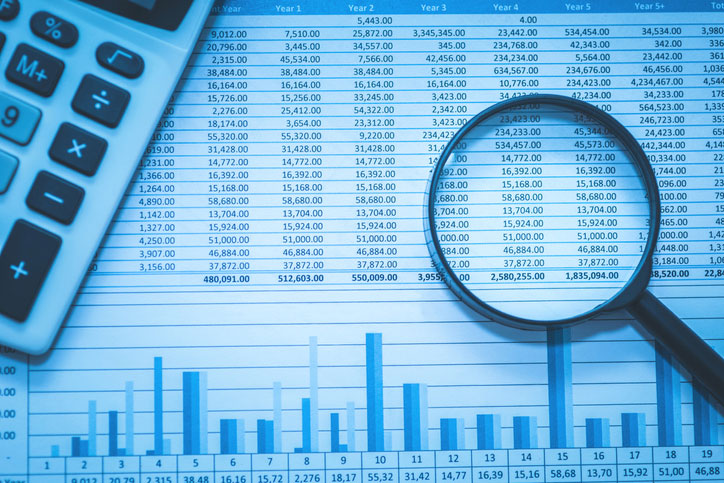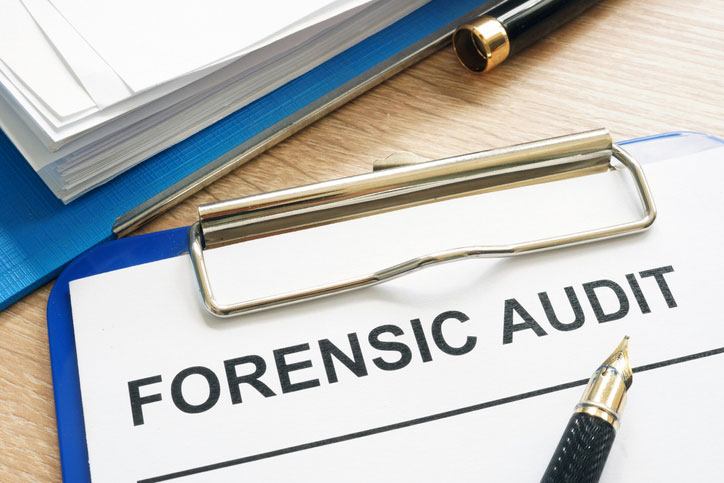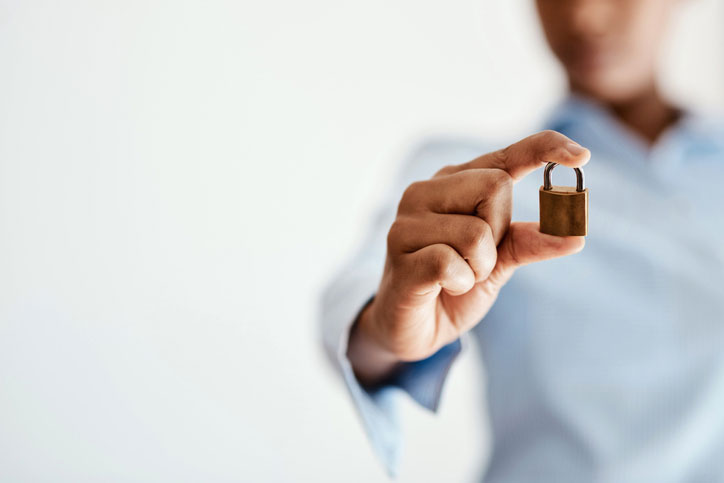
In 2001, the world was shocked when energy and commodity-trading giant Enron filed for bankruptcy. How could a company that claimed $101 billion in revenue the previous year suddenly have nothing? Accountants discovered that Enron executives had been using shady accounting practices and off-shore accounts to hide their losses for years. In the wake of Enron’s fall, investors lost billions and their employees’ pensions evaporated into thin air.
In April 1997, lawyer Stefanie Rabinowitz took a relaxing bath after a night out with her husband Craig. Craig supposedly heard a thump in the bathroom and found his wife dead, the victim of an apparent accident. But after an already skeptical coroner received an anonymous tip, suspicions fell on squeaky-clean Craig. Forensic analysts discovered he had strangled Stefanie, but it took a diligent CPA to establish the motive. Craig’s latex products business was a sham. He’d also been blowing through cash at a local strip club after becoming obsessed with another woman. He likely wanted to collect on his wife’s $1.8 million life insurance policy and flee. Craig eventually pled guilty to Stefanie’s murder.
Both of these cases demonstrate one thing: whether a crime is about greed and deception or blood and passion, bringing the culprits to justice means following the money. Forensic accountants do just that.
If you have a knack for numbers and an unshakeable sense of justice and integrity, forensic accounting could be your calling. But what will your calling entail and how do you prepare for it?
Scope of Forensic Accounting
A forensic accountant’s primary duties can be broadly separated into two areas: litigation support and investigative accounting. Some professionals focus their efforts on one part or the other, but many carry out both.
Litigation Support
During an ongoing lawsuit, lawyers often call on forensic accountants to act as expert witnesses or consultants. For example, they can provide testimony to the court that explains how and why a defendant carried out a financial crime. Or, they can help lawyers obtain supporting documents and ask the right questions during a trial.
Forensic accountants can also help courts and lawyers assess financial damages. Maybe a case of fraud caused a small business to shut down temporarily. Or perhaps a breach of contract restricted a self-employed individual’s ability to work. In either case, accountants ensure that the wronged party gets the compensation they deserve.
Investigative Accounting
Forensic accountants can also be key players in actual investigations. In white collar investigations, they can comb through financial records to discover insider trading, embezzlement, and cases of outright theft.
However, forensic accountants don’t just help discover purely financial crimes. By tracing money flow, they aid law enforcement in breaking up organized crime rings linked to theft, human trafficking, drugs, and even murder.
Forensic Accounting Skills
A forensic accountant is one part public accountant, one part investigator, and one part skilled collaborator. Their hard and soft skill sets must reflect this dynamic role.

Hard skills forensic accountants use include:
- Asset tracing. Criminals and parties involved in civil suits often hide assets. In cases of fraud, these assets are gained illegally. In divorces, parties sometimes hide assets they don’t want the courts to seize. Accountants must know how to follow the money and find these resources.
- Auditing and financial analysis. To uncover crimes, accountants have to conduct financial audits of entire businesses to discover where money was taken from and who benefits from taking it. This can also be helpful in creating policies that discourage fraud.
- Statistical analysis. Accountants frequently conduct statistical analyses on business trends to determine if fraud or theft was perpetrated deliberately.
- Knowledge of financial laws. Businesses and individuals circumvent different laws in different ways. Knowledge of how things like taxes, workers’ compensation, and Securities Exchange Commission (SEC) laws work is invaluable when directing an investigation.
- Fraud, self-dealing, and insider trading are often large-scale conspiracies. Financial accountants interview people to determine the nature of certain crimes and discover where assets and records are hidden.
- Business valuation. During bankruptcies, business acquisitions, and mergers, forensic accountants often aid executives and public officials in determining what businesses are actually worth. This includes analyzing all assets and liabilities.
Despite the technical nature of the job, soft skills are equally important in forensic accounting. A professional must remain objective, analytical, and inquisitive in all they do. On top of that, forensic accountants are often:
- Focused on ethics.
- Detail-oriented.
- Perceptive of and responsive to small cues (body language, word choice, etc.).
- Skeptical of surface-level appearances.
General Areas of Forensic Accounting
Which skills a forensic accountant relies on is typically determined by the area they work in. For instance, a forensic accountant working with a bank might need to know how to value companies while one working on criminal cases may rely more on their asset tracing abilities. Fortunately, there are enough specialties within the field to require the talents of all kinds of professionals.
Civil Law
Civil laws are generally concerned with relationships between individuals or entities like private corporations. When one individual or entity suffers loss or harm due to the actions or negligence of another, the wronged party can bring their case to court.
Examples of civil cases forensic accountants can help with include:
- Divorce
- Family law
- Medical malpractice
- Personal injury
- Insurance claims
- Inheritance and trust disputes
In these examples, asset tracing and the ability to objectively assess financial damages are key skills.
Criminal Law
In contrast to civil law, criminal law is concerned with crimes against the public at large or the government. The punishments for such violations are often financial penalties and/or incarceration.
Criminal law is quite a large area, but forensic accountants often aid law enforcement and legal teams in investigating:
- Human trafficking
- Drug trafficking
- Embezzlement, bribery, and other forms of corruption
- Theft
- Money laundering in the commission of non-financial crimes
- Insurance fraud
- Violent crime
- Terrorism and organized criminal activities
Once again, asset tracing is a valuable skill in this area, but interviewing, analysis, and the ability to coordinate with multiple teams (the FBI, local law enforcement, and various legal entities) are particularly important.
Business Law
In corporate America, fraud and otherwise unethical actions can result in both civil and criminal suits. Forensic accountants who specialize in this area are prepared to handle both.
Common issues accountants tackle in the business world include:
- Employee theft
- Embezzlement
- Insider trading and self-dealing
- Business acquisition and bankruptcy
- Contract disputes
- Workers’ compensation issues
- Tax evasion and fraud
- Misappropriation of company assets
- The forging of financial documents in the commission of other crimes
Sometimes, companies themselves hire investigators to solve these issues. In other cases, employees, government agencies, and regulatory bodies like the SEC hire them when they suspect criminal activity.
Prevention and Compliance
Forensic accountants do more than react to fraud. They’re also integral to preventing it. To accomplish this lofty goal, they have to use everything in their toolbox.
First, the accountant might conduct a compliance audit. This is an in-depth review of how the company complies with all tax and regulatory laws. While this is a great fraud detection tool, it also helps businesses from inadvertently incurring fines.

Next, even if fraud isn’t discovered, the forensic accountant will likely have to work with executives and outside officials in creating fraud prevention policies like:
- Employee interviews. A 2020 study found that when employees felt treated fairly, they were less likely to commit fraud and theft. Interviewing employees and faithfully addressing their needs can be a powerful tool.
- Using fraud-detection and reporting technology. Some programs check against historical trends to identify fraud in large corporations. Others also include anonymous reporting technology so ethical employees can report without fear of retribution.
- Setting up internal controls. Internal controls like the separation of duties, frequent safe counting, user access controls, and documentation management can lessen the chance of theft.
- Educating employees. Teaching employees about red flags can promote a transparent working environment.
Setting up these measures will likely include doing months of training, conducting countless interviews, and spending a lot of a business’s budget. But considering the SEC collected a record-breaking $6.4 billion in penalties in 2022, the stakes are high. Forensic accountants can even the odds.
Forensic Accounting Careers
While forensic accounting may sound like a relatively small niche, organizations of all types employ them as full-time employees and independent contractors.
Here are a few types of organizations you might work for in your own career:
- Accounting firms. Firms that offer broader accounting services (like the Big Four of Deloitte, PwC, Ernst & Young, and KPMG) also offer forensic services to private businesses and public institutions alike.
- Law Enforcement Agencies. The FBI, CIA, ATF, and state and local agencies all employ financial professionals to trace crimes.
- Insurance Companies. The Coalition Against Insurance Fraud says fraud costs the healthcare insurance sector alone $3.1 billion annually. Forensic accountants and other investigators work together to investigate these crimes for insurance companies of all kinds.
- Private Businesses. While many businesses utilize accounting firms and consultation services, some hire their own in-house professionals to manage fraud prevention programs.
- Banks use accountants to monitor internal fraud risks and investigate disputes with clients.
- Regulatory Agencies. The SEC, Consumer Financial Protection Bureau, and the Financial Crimes Enforcement Network of the Department of Treasury all employ investigators to help them enforce federal financial regulations.
- Experienced forensic accountants sometimes pivot into education where they can teach in criminal justice programs and schools of accountancy alike. Many also conduct research that keeps their colleagues up-to-date on trends and technology.
Overall, the Bureau of Labor Statistics expects employment in the accounting industry to grow by 6% through 2031 which translates to about 136,000 job openings every year. The median pay for accounting professionals is $77,250 annually with the top 10% bringing home upwards of $128,000. Forensic accountants may be a small sliver of the industry, but their advanced skills make them an elite group whose salaries may very well exceed the median pay projected by the BLS.
Forensic Accounting Education and Degree Options
Many students prepare for careers in forensic accounting by earning bachelor’s degrees in accounting, finance, or another related field. Some even take on minors in criminal justice, business law, or psychology. Programs focused strictly on forensic accounting exist at the bachelor’s level, but they are few and far between.
Regular accounting classes can give you a great foundation to build more specialized knowledge on later. You’ll likely take courses on:
- Auditing
- Statistics
- Ethics
- Accounting software
- Taxation
- Management accounting
- Cost accounting
- Corporate finance
- Organizational management and theory
If you continue on to the Master’s level, you’ll likely find more programs that offer the forensic specialization. In these programs, you can enhance your skill set with classes about identifying forged documents, interview techniques, and fraud examination and prevention. But even if you choose to pursue a Master’s in Accounting, Auditing, Investments, or Corporate Finance, you can still gain knowledge and experience that may prove valuable to your forensic career.
Entry-level Work and Earning Your CPA License
Whether you ended your education at the bachelor’s or Master’s level, you’ll likely need two more things before beginning your career in forensic accounting: experience and Certified Public Accountant (CPA) licensure.
According to the Association of Certified Fraud Examiners (ACFE), the biggest anti-fraud organization in the world, most forensic accounting accounting jobs require one to three years experience in the broader field of accounting. School-based internships can be a great place to start. Otherwise, you may want to seek positions in sectors you wish to continue your career (business, law enforcement, the public sector, etc.).
During this time, you may want to start pursuing CPA licensure in your state. This advanced credential, while not specific to forensic accounting, can enhance your accounting knowledge and is highly regarded in the industry. At this point, you may be able to seek forensic accounting roles.
Learn More About Becoming a CPA.
Forensic Accounting Certification Credentials
With your CPA license and some experience under your belt, now’s the time to pursue advanced forensic accounting credentials and establish yourself as a competent industry professional.
One option is the Certified in Financial Forensics (CFF) credential offered by the American Institute of Certified Public Accountants (AICPA). As the organization that administers the CPA exam and helps shape state CPA regulations, the AICPA is a great resource to turn to for professional development. Many forensic professionals, particularly those who work in business law, also seek the AICPA’s Accredited in Business Valuation (ABV) certification.
According to AICPA regulations, earning the CFF requires:
- Having a valid CPA license in good standing.
- Passing the CFF exam.
- Having at least 1,000 hours of professional forensic accounting experience.
- Obtaining 75 hours of industry-related continuing professional development credits within five years of submitting your CFF application.
Another great option is the Certified Fraud Examiner (CFE) certification from the ACFE. Because this organization is more broadly focused on fraud detection, applicants don’t need to be CPAs to apply.
To earn the CFE credential, you must:
- Join the ACFE.
- Pass the CFE exam.
Yet another certification industry professionals seek is the Certified Forensic Accounting (CRFAC) credential offered by the American Board of Forensic Accountants (ABFA). Established in 1993, the ABFA is one of the country’s first forensic accounting organizations and credentialing agencies. They also offer credentials in forensic auditing, bookkeeping, cybersecurity, and healthcare auditing.
Obtaining the CRFAC involves:
- Being a CPA and a member of the ABFA.
- Having a bachelor’s or Master’s degree.
- Gaining two years of accounting experience.
- Submitting supporting documentation including two professional references.
- Taking the organization’s Forensic Accounting Review program.
- Passing a five-part exam.
Criminals are always finding new ways to exploit society’s vulnerabilities and escape law enforcement. Earning professional credentials can help you keep your skill set relevant, put you into contact with professionals who have done and seen it all, and tell potential employers that when it comes to preventing and investigating fraud, you’re an expert.
U.S. Bureau of Labor Statistics salary and labor market information for Accountants and Auditors is based on national data, not school-specific information. Conditions in your area may vary. Data accessed May 2023.




